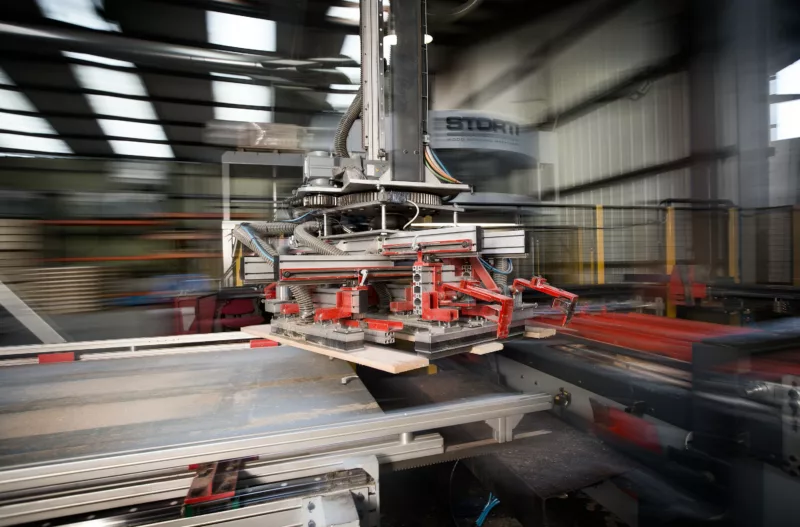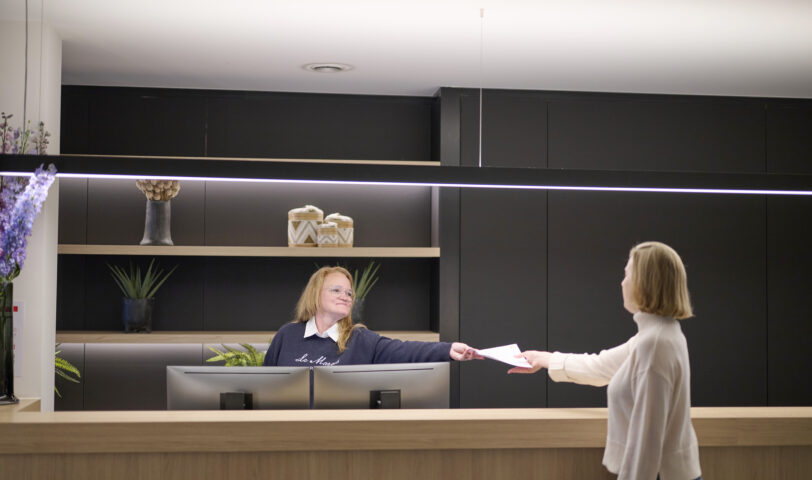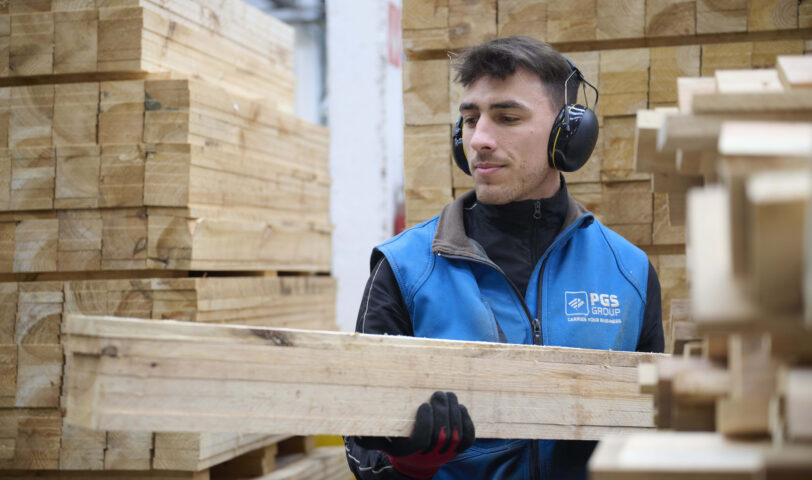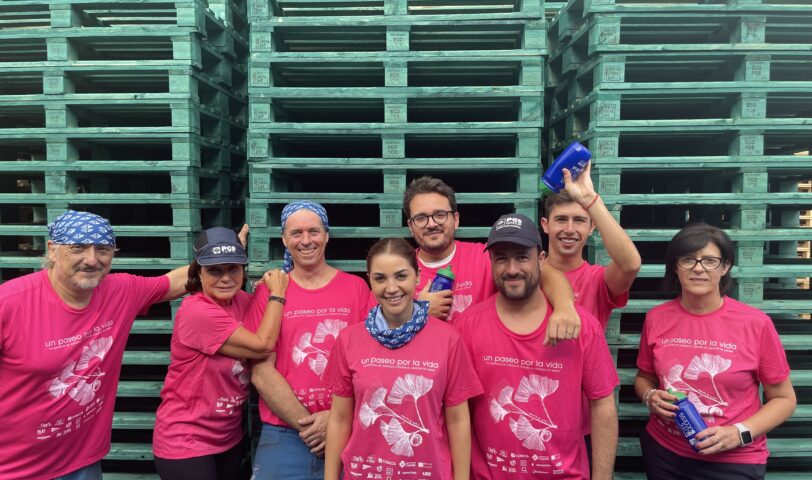Circularity at the Core Resource outflows
At PGS Group, circularity is not a trend, it’s the core of our business model. Founded in 1993 with the repair and sale of reconditioned wooden pallets, we have since built on strong vertical integration. We control the entire value chain, from sawmills to nail production, pallet manufacturing, repair, pooling, and transport. This integrated approach strengthens our impact and supports the transition from linear to circular economies.
Our circular activities now surpass our linear ones. Each year, we produce around 25 million pallets, yet we recover even more—30 million—from the market for repair and reuse. This extends our impact beyond our own products, strengthening the entire logistics sector by keeping wooden pallets in circulation longer, reducing demand for virgin materials, and lowering the carbon footprint of transport and packaging systems.
In the interview below, Bart, our COO, shares some more insights into the circularity of our products and services.

Pallet Production Eco-Design Principles
Across our operations, we design and manufacture a wide variety of over 1,500 custom pallet models. To reduce waste from the start, we apply eco-design principles that optimize material use without compromising all of its product requirements (quality, safety, performance...). Pallets are tailored to use only the necessary amount of wood, avoiding over-engineering and reducing the use of virgin resources.
Wood is our material of choice for good reason. It’s strong, renewable, repairable, and reusable. It stores biogenic carbon—around 27 kg for an average standard pallet— and supports a regenerative materials loop.
Where possible, we replace primary materials with recycled alternatives. We promote the use of wooden compressed blocks to substitute solid timber components, and produce nails made from scrap metal (more than 90%), further lowering the material footprint of our products.

Pallet Reconditioning Extending the lifespan of products
Our circular approach goes beyond eco-design. With our offer of reconditioned pallets and repair services, we extend the life of every unit. PGS collects used pallets from customers, partners, and pooling networks. These are sorted, inspected, and reconditioned at our dedicated sites to ensure quality and extend their usability.
Pallets that are beyond repair are dismantled, so that reusable elements can have a second life. Through this practice, less than 1% of the new wood we purchase is used for repair activities, reducing waste streams even more.
PGS REVERSE Circular Logistics Solutions
Our PGS REVERSE division takes circularity a step further by offering pallet pooling and logistics management. These solutions enable pallets to be used multiple times over several years, reducing the need for new production. This approach helps lower raw material use, extend product lifespans, minimize waste, and reduce greenhouse gas emissions.
While most pooling systems are limited to controlled logistics networks (such as FMCG), PGS REVERSE provides circular logistics solutions to all sectors—including those with less predictable flows. This is made possible by our vertically integrated business model and expertise across the value chain, from sawmills to pallet manufacturing, reconditioning and pooling.
PGS REVERSE operates through three complementary logistics solutions across Europe:
- PGS RLS® – Relocation solution for standardized EPAL/EUR and Düsseldorfer pallets.
- ECOPGS® – Eco-designed pooling pallets in various formats, accesible to all sectors.
- REVERSE+ – Delegated management and relocation of a customer's logistics park.

PGS RLS Shared use of standardized pallets
PGS RLS supports circular logistics by enabling the shared use of standardized EPAL/EUR and Düsseldorfer pallets through a virtual credit-debit system. Pallets no longer follow a one-way path—they move between clients, are repaired when needed, and reused again and again.
The system also limits empty transport: used pallets are returned to the nearest facility within our network, lowering transport-related emissions. With more than 250 storage and repair centers across 14 European countries, PGS RLS operates through a dense regional network that ensures both proximity and efficiency.

ECOPGS Alternative to disposable pallets
ECOPGS is our own pooling pallet that offers a circular alternative to disposable one-way pallets. Designed for shared use across multiple clients, it extends circular packaging solutions to a wider range of industries, not only controlled logistics networks such as FMCG. In doing so, it helps more companies transition from linear to circular systems.
What further distinguishes ECOPGS is its eco-design. Each pallet is engineered to minimize material use, optimize durability, and allow for repeated use and repair.
This solution also demonstrates the importance of value chain collaboration in circular logistics. Customers inform us where our green-colored pallets are sent, enabling targeted recovery. Once retrieved, they benefit from a financial incentive—creating a shared responsibility for closing the loop and advancing a more circular economy.

REVERSE+ Full-service management of the logistics park
Unlike the previous multi-client solutions, REVERSE+ is a single-client service offering delegated management and relocation of a customer's logistics park.
It provides a circular solution for non-standard pallet types and specific packaging, such as headboard pallets and boxes that are excluded from traditional pooling systems. Through REVERSE+, this packaging is optimized, distributed, collected and maintained instead of discarded.
In addition, REVERSE+ enhances the efficiency of customers' logistics parks, based on our long-standing experience and operational know-how across the group.

Maximizing Material Use Valorizing Byproducts
During our core activities, we generate byproducts such as wood chips, sawdust, bark, and metal scrap. These are not treated as waste but as valuable secondary materials with potential for reuse.
In line with our circularity goals, we work to maximize their valorization. Many already serve as raw materials for other industries — including particle board, compressed block, and agricultural or landscaping applications. When this isn’t possible, wooden byproducts are used for energy in our biomass systems to support pallet drying.
By returning these residual flows to productive use, we reduce material loss, keep carbon stored in wood longer, and limit waste. Our goal is to keep expanding recovery channels so every part of the byproducts we process serves a purpose and retains its value for as long as possible.
Contact
Should you require further information or have any inquiries on our sustainability initiatives, we invite you to reach out to us at CSR@pgsgroup.com.



